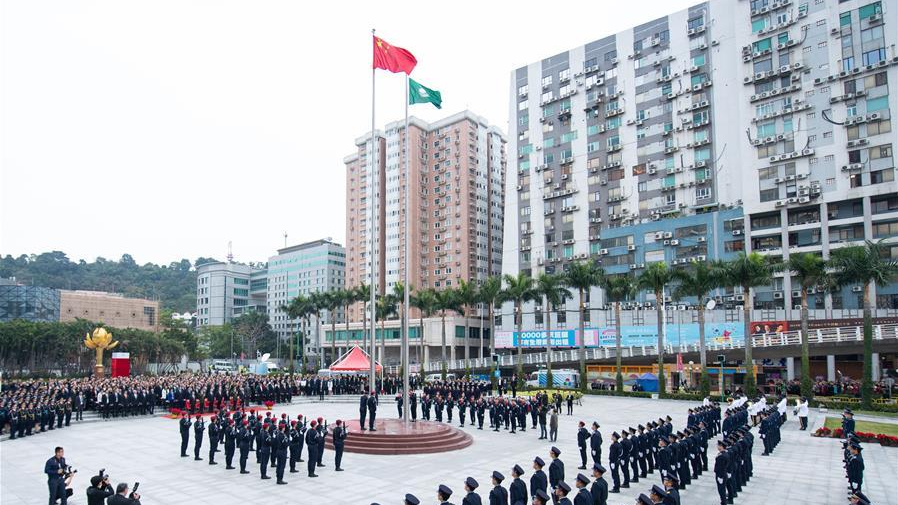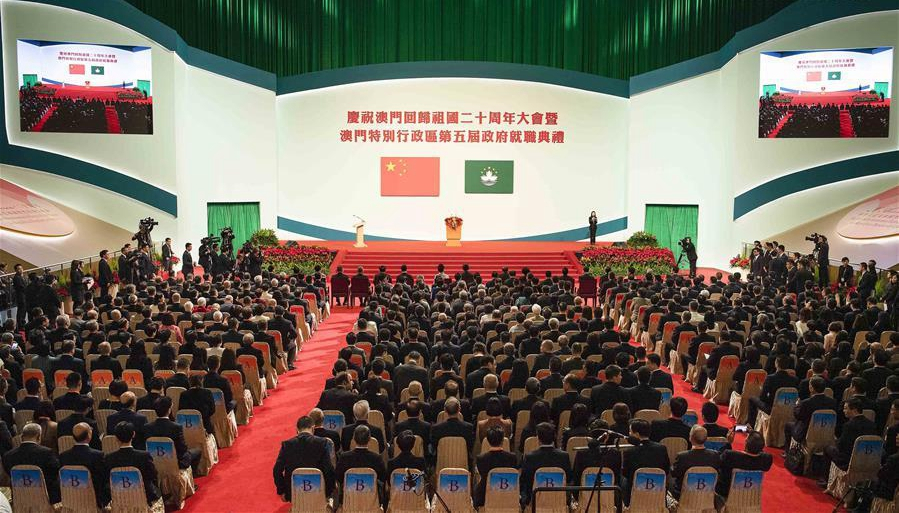
A flag-raising ceremony marking the 20th anniversary of Macao's return to its motherland at the Golden Lotus Square in Macao, south China, December 20, 2019. /Xinhua Photo
A flag-raising ceremony marking the 20th anniversary of Macao's return to its motherland at the Golden Lotus Square in Macao, south China, December 20, 2019. /Xinhua Photo
Editor's Note: Timothy Kerswell is an assistant professor in the Department of Government and Public Administration at the University of Macao. The article reflects the author's opinions and not necessarily the views of CGTN.
President Xi Jinping's speech to celebrate the 20th anniversary of Macao's return to China was a celebration of Macao's successful implementation of the "One Country, Two Systems" policy. While President Xi addressed several issues, he laid particular emphasis on why Macao proved the viability of "One Country, Two Systems," what conditions were necessary for this success and underlined that the governance of the Macao and Hong Kong special administrative regions (SAR) was strictly a matter of China's internal affairs.
Macao's ability to follow a path of orderly progress is why it could put "One Country, Two Systems" into practice successfully. President Xi praised Macao residents for their patriotic sentiments and feelings of belonging to China as Chinese citizens. This factor allows Macao residents to recognize the supremacy of central government authority while utilizing their autonomy to develop Macao and promote the welfare of its residents based on Macao's unique historical circumstances.
President Xi said the success of "One Country, Two Systems," as shown by Macao, rests on the acceptance of "One Country" as the necessary precondition for the granting of autonomy under "Two Systems." The ideological roots of Macao's success come not only from its sense of patriotism but also from Macao residents' willingness to buy into the system and believe in its possibilities. Macao has never wavered in the face of domestic development challenges, or external pressure, and should be applauded for this.
In his speech, President Xi also stressed China's zero-tolerance approach for foreign interference in China's sovereign affairs, highlighting that the governance of the special administrative regions of Macao and Hong Kong are strictly China's prerogative. One of the many reasons for Macao's success is the relative absence of meddling and intrusion. In the Hong Kong SAR, various foreign governments, including the U.S. and the UK, their associated NGOs and so-called "civil society" groups frequently play this role. President Xi's speech indicates that China places a high priority on confronting the challenges that foreign interference poses to both its development and that of both the Macao and Hong Kong SARs. This should serve as a warning to those elements who aim to generate instability in Macao and Hong Kong. It was a strong indication that China's unity, the idea of "One Country," is paramount and that China will take any steps necessary to maintain this unity in the face of external pressure.

A gathering in celebration of the 20th anniversary of Macao's return to its motherland in south China's Macao, December 20, 2019. /Xinhua Photo
A gathering in celebration of the 20th anniversary of Macao's return to its motherland in south China's Macao, December 20, 2019. /Xinhua Photo
An important aspect of President Xi's speech was to link development to the improvement of citizens' well-being. Praising Macao's ability to provide critical social goods such as free education, healthcare and social security while providing increased living standards indicates his commitment to a vision of shared progress. When it comes to evaluating whether development is successful or not, President Xi stressed the mantra of "Put people first," emphasizing the continued effort toward a more equal distribution of wealth and the creation of public goods and public infrastructure in Macao. Specifically, he highlighted transport, housing, healthcare and care for the elderly as key areas of policy focus for the government of the Macao SAR.
In what could be seen as a word of caution for the future, President Xi advised the Macao SAR to "break new ground even while the going is good." When a country's economy is booming, it is easy to enjoy the good times, but only the most visionary thinkers consider what will happen once the boom in a specific industry is over. One of the main challenges highlighted for Macao's future was the need to carefully strategize its economic diversification. With neighboring countries becoming competitors in the gaming industry, whose growth is beginning to slow, this is a vital task in the short to medium term.
President Xi acknowledged that Macao had made progress in diversification in new or expanded industries – such as education, finance and traditional Chinese medicine – but challenges remained in this area. He hinted at the solution to these challenges by emphasizing Macao's ability to further develop the Hengqin area, including expanding the provision of education and establishing closer links with Zhuhai. As the closest geographical regions, this approach is sensible and will allow Macao to play a more significant role in the Greater Bay Area and further integrate its economy with the Chinese mainland.
The role of patriotic community organizations as a bridge between the government and residents was also celebrated. Macao has a long history of patriotic community organizations serving as vital links between government and society, leading to better government policy. This acknowledgment underlines that both of the central government and the Macao SAR are willing to work with and through community organizations, which have proved their commitment to China's sovereignty.
(If you want to contribute and have specific expertise, please contact us at opinions@cgtn.com.)